UPDATE: The link resolver is again working in both the new and classic versions of Web of Science. However, if you wish to use LibKey Nomad with Web of Science, you will need to use the instructions below on how to access the classic version.
The WebBridge LR link resolver is currently not working in both versions of Web of Science. This problem has been reported and we will update when the functionality has been restored.
The new version is now the default view for Web of Science and LibKey Nomad does not work with it now, unfortunately. With the link resolver not working in either version, getting to full text of articles is a bit more difficult, but you can still access the old version of Web of Science where LibKey Nomad works fine,
To get to the classic version of Web of Science click on the Products menu to the right of the screen; there you will see the link for Web of Science (Classic):
If you need assistance with this or any other Library resources, please contact us.
UPDATE: The Link Resolver has been restored in PubMed and is working both on- and off-campus.
Now that it’s back up and running, be sure to check out our new one-click PDF feature described here.
________________
The WebBridge Link Resolver is currently unavailable in PubMed. We will update as soon as the problem is fixed.
The link resolver is available in all other enabled databases, and you can find that list here.
If you need any assistance, please contact us.
Thanks to our subscription to BrowZine and their new tool LibKey Link, we are happy to announce that starting today for many articles in PubMed you can get to the PDF with just one click!
You will need to follow the link to PubMed with a special code that turns on our link resolver. When viewing the abstract of a particular citation, click our “Check Full Text” icon:

When available, you will be taken directly to the PDF of the article. If that is not possible, you will be brought instead to our WebBridge Link Resolver results page with the available options to retrieve that article.
If you are off-campus, you will be asked to authenticate either through OpenAthens or with your Library barcode and PIN.
For more information about BrowZine, see our LibGuide. We also have LibGuides available for Off Campus access, the link resolver, and OpenAthens.
Today we’ve launched a new and hopefully improved look for the WebBridge LR Link Resolver results page. All of the links you’re used to are still there, but now they’re in a slightly different presentation:
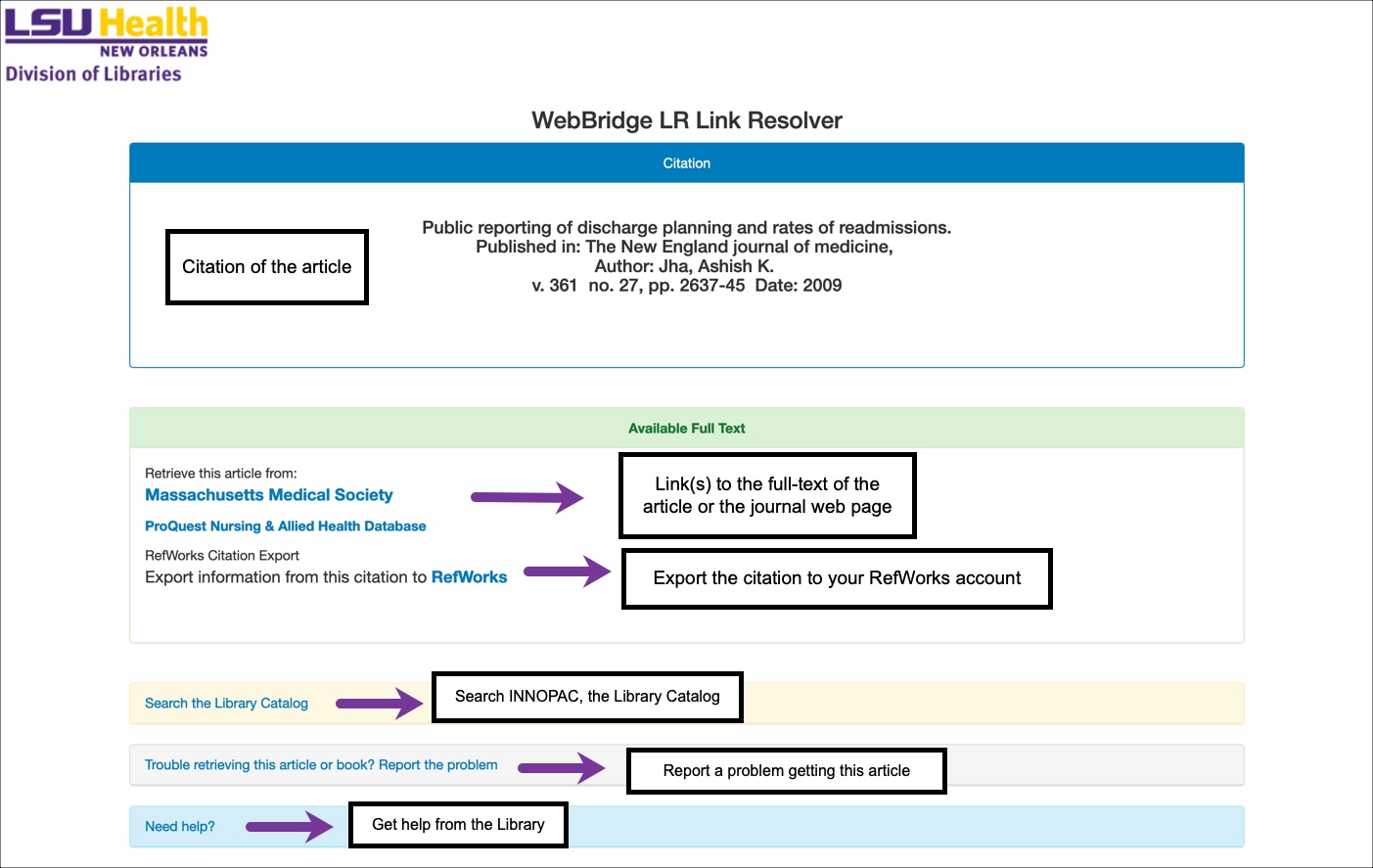
If you need more information about the WebBridge Link Resolver, you can take a look at the LibGuide that will walk you through the basics.
Need help with this or any other Library resources? Please contact us.
After close to two months since disappearing, the WebBridge LR Link Resolver is available once again for Google Scholar. If you’d like more information about how the link resolver works with Google Scholar, click here.
If you need help with this or any other Library resource or service, contact us.
The WebBridge LR link resolver is not available in Google Scholar at this time. We have reported the issue and will update when we have more information.
If you need assistance retrieving articles from Google Scholar or any other database, please contact us.
The WebBridge LR link resolver is working again in Scopus. The provider of that database was able to find a fix for the issue.
If you need assistance with Scopus, the link resolver, or any other Library resources, please contact us.
After many, many months of not working correctly, we are happy to report that the WebBridge Link Resolver is once again available for PubMed. As our most-used database, we are relieved to offer this service to all of you after such a long absence.
If you would like a refresher or an introduction to how the link resolver works in PubMed, you can refer to this earlier post. Additionally, if you’d like to set up your My NCBI account to display the link resolver icon, please see this walkthrough.
For those who want to know more about the WebBridge Link Resolver, this LibGuide is made just for you.
Need any more information or assistance? We’re always available to help.
The link resolver being used for PubMed is once again working correctly.
If you need assistance with any Library resources, please contact us.
The problem with PubMed and the WebBridge Link Resolver is still ongoing, so a new service is in use as a temporary alternative to bring link resolver features to PubMed. When you click on our “Check Full Text” icon in PubMed, a screen similar to the following listing any potential sources to get to the article you need is displayed:
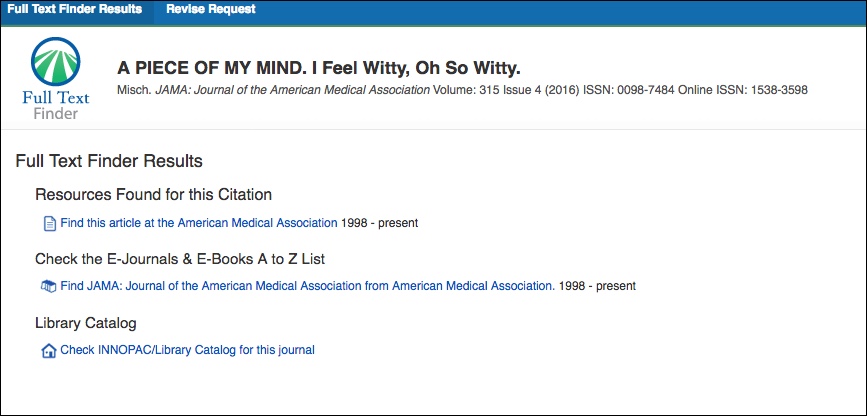
This temporary option uses the coverage information from our E-Journals & E-Books A to Z List. Although it covers many of the journals we receive, it does not include all of our subscribed titles nor our print holdings. Regardless of whether an online source is found for the article, each page will provide a link to the Library’s Catalog so that you can also check there to see if we have that particular journal in print or online.
We are still hoping for a fix so that we can return to using the WebBridge Link Resolver in PubMed, and we apologize for any troubles this temporary change in service has and continues to cause. If you need assistance with this or any other Library resources, please do not hesitate to contact us.
As we are still waiting for the problem with PubMed and the WebBridge Link Resolver to be fixed, we have introduced a temporary alternative to restore some of the link resolver features to PubMed. When you click on our “Check Full Text” icon in PubMed, you will now see a screen similar to the following listing any potential sources to get to the article you need:

This temporary option uses the coverage information from our E-Journals & E-Books A to Z List. Although it covers many of the journals we receive, it does not include all of our subscribed titles nor our print holdings. Regardless of whether an online source is found for the article, each page will provide a link to the Library’s Catalog so that you can also check there to see if we have that particular journal in print or online.
We hope this new interim option will be of help to better get you to the articles you need when searching PubMed. Once the problem is rectified, we will return to using the WebBridge Link Resolver for PubMed, but we currently do not know when that will happen. Additionally, the WebBridge Link Resolver continues to be used for all other Library databases where it is presently available.
If you need assistance with this or any other Library resources, please do not hesitate to contact us.
As a result of the recent change to HTTPS on all NCBI sites, the WebBridge Link Resolver is no longer working in PubMed. When you click the “Check Full Text” icon, you will see this page:
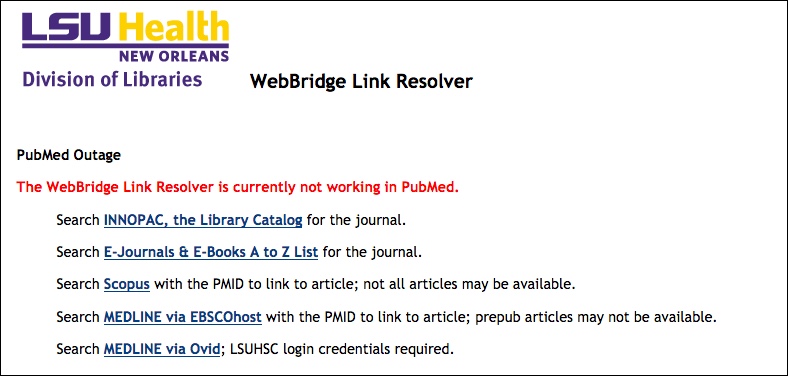
Unfortunately, there is no data being sent from PubMed to our link resolver’s system, so you will be unable to check whether the Library has access to an article from PubMed for the foreseeable future. The issue is currently being investigated, but there is no estimate as to when we might have a solution.
In the interim, when you find an article you need you can check whether the Library has access to that journal via INNOPAC, the Library’s online catalog or the E-Journals & E-Books A to Z List. Links to those sources are now provided when you click the “Check Full Text” icon in PubMed.
We have also added options that allow you to search other databases with the PMID: the links displayed for Scopus and MEDLINE via EBSCOhost have the PMID added to provide a quick way to use the link resolver in these two databases to get to the article you originally searched in PubMed. A link is also provided to search MEDLINE through Ovid, and the link resolver is available in this database as well.
We will update as soon as we have more information, but if you need more assistance please do not hesitate to contact us.
Recently you may have noticed alerts on PubMed and all other NCBI sites regarding testing. This is to prepare all of their sites to permanently transition to HTTPS, but we have discovered that when this testing occurs it affects the ability to see results from the WebBridge Link Resolver, especially in PubMed.
The next scheduled testing time is Friday, November 4, 2016, from 9am until 1pm CDT:

When testing has commenced, you will see a banner similar to this one:

During this test period, whenever you click the “Check Full Text” icon for the WebBridge Link Resolver all results will look like this page regardless of whether we have access to the article:
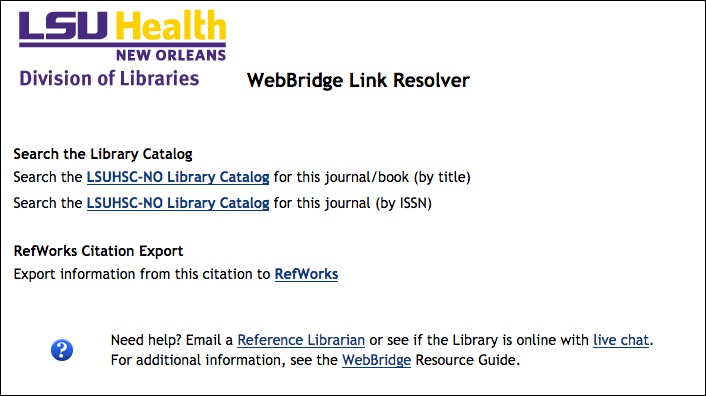
Unfortunately, there is nothing we can do to get the link resolver to work while NCBI is performing these tests, but there are alternatives to find out whether the Library has access to the article you need. You can check the journal’s title via INNOPAC, the Library’s online catalog. You can also use MEDLINE through Ovid or EBSCOhost; the link resolver is included in both of these databases and they are not affected by the testing that occurs in PubMed or other NCBI sites.
If you are curious as to why the NCBI sites are changing to HTTPS, this site has all of the information. Additionally, if you need help with this or any other Library resources, please do not hesitate to contact us.
We are happy to announce the WebBridge Link Resolver is now available for journal articles cited in all STAT!Ref books. Look for citations to articles in the “Selected Readings” areas throughout the works:
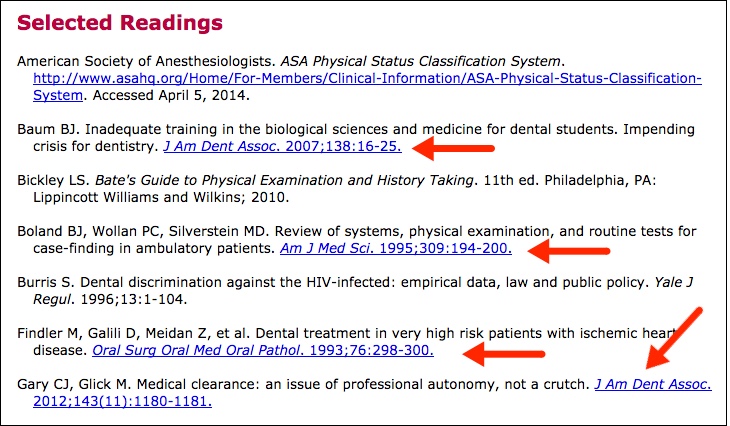
When you click these linked citations, you will now see the “LSUHSC-NO Check Full Text” link resolver icon to check whether the Library has access to that article:
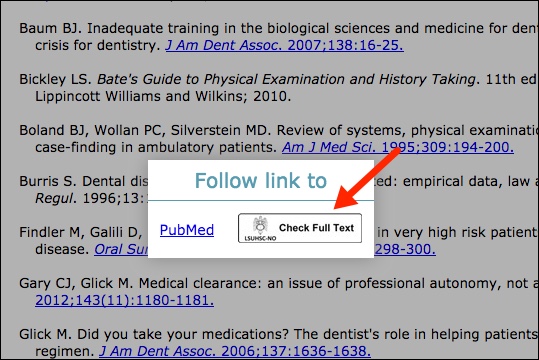
If you need any more information on the WebBridge Link Resolver, be sure to check out this LibGuide. If you need assistance with these or any other Library resources, please do not hesitate to contact us.
Every now and then there is a hiccup in the process by which information goes through a number of channels in order to get you to your article when using the WebBridge Link Resolver from many Library databases. If you’ve seen the dreaded “No DOI found” message, you’ve probably wondered where to go next.

We are happy to report we have added an option that now gives you the option to get to the journal where the article you need is published if you see the above screen when attempting to retrieve an article. For those resources where the Digital Object Identifier (DOI) is integral to this process, you will now see another link that will bring to to the journal’s site:
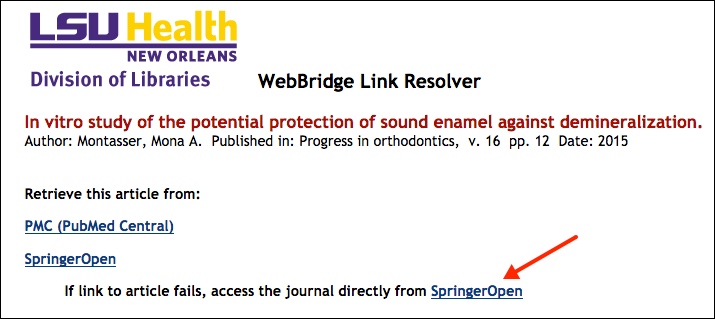
If you encounter the “DOI not found” error, just return to the link resolver result screen and click the alternate link to get to the journal or the publisher’s site.
We hope that this will help alleviate some of the trouble that you have getting articles through the link resolver. If you need more information about the WebBridge Link Resolver, check out our LibGuide. Also, if you need help with this or any other Library resources, please contact us.
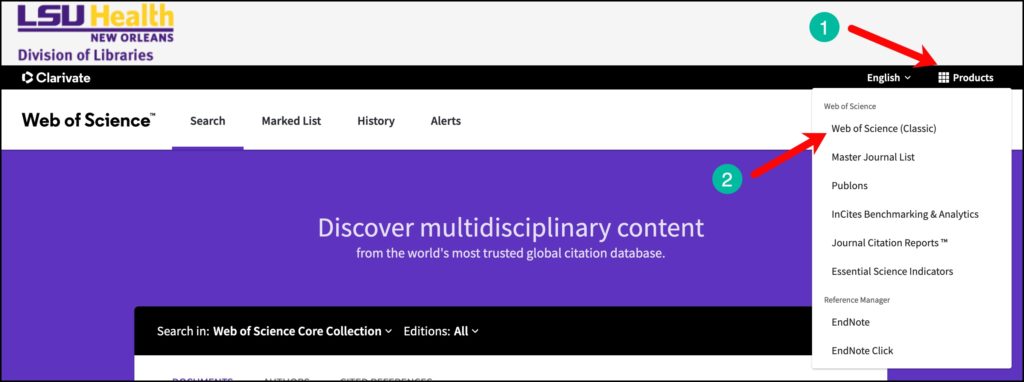

 myLSUHSC
myLSUHSC







